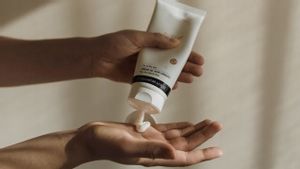YOGYAKARTA Skin that is without problems is forbidden by many people. To get it requires proper care and good intake. In caring for the skin, skincare is not only a topical nature. But also food intake that is rich in vitamins. Here are the vitamins that your skin needs and benefits.
Sources of vitamin A include carrots, dark green vegetables, sweet potatoes, and eggs. These vitamins help cell change, improve texture and skin color, and fight acne. Please note, that skin with vitamin A produces retinoids. This content can also be obtained in topical care products.
If you use a retinoid formulated in skincare, you only need to apply it twice or once a week. Then it can increase the frequency of usage to once a day. Because the retinoid is sensitive to sunlight, it is necessary to wear sunscreen after applying a product containing a retinoid.
Vitamin C is an antioxidant that helps overcome and prevent oxidative damage due to free radicals. Most studies show oxidative damage makes skin aging. Vitamin C can be obtained by consuming oranges, most vegetables including broccoli and cauliflower, as well as labus. You can also apply topical vitamin C in serum form that is beneficial for increasing skin elasticity and helping the skin look younger. Vitamin C, also benefits in stimulating collagen production and fighting damage due to exposure to the sun.
Like vitamin C, vitamin E also includes antioxidants that help slow skin aging due to free radicals. Foods that contain vitamin E include seeds, nuts, spinach, mangoes, and corn. You can also add supplements to ensure the adequacy of daily vitamin E needs. You can also use skincare products that formulate vitamin E for topical purposes. It's important to know, vitamin E when combined with vitamin C can help overcome acne and wound healing.
Vitamin D supports skin cell metabolism that helps the skin grow and improve itself. Launching Medical News Today, Thursday, August 29, if you lack vitamin D can cause problems in the skin. Well, to get your vitamin D intake, you can consume milk, contracts, salmon, tuna, and fish.
Vitamin D can also help overcome chronic inflammation. Inflammatory can cause skin irritation, several types of acne, and eczema. In fact, one 2010 study found that the use of creams containing vitamins D and E can help overcome atopic dermatitis.
Vitamin B is complex including vitamins that dissolve in water. Consisting of 12 components of vitamin B that help the body produce new healthy skin cells. Although further research is needed on the benefits of complex vitamin B on the skin, the topical skincare formula will be more effective.
SEE ALSO:
Vitamin B3 or niacinamide, helps overcome some skin aging signs such as black spots and skin tone changes. Some women also report improvements to the skin and hair when consuming vitamins that contain folic acid.
For vitamin B5, or pantotenetic acid, it can help treat acne and skin aging. This study involved several participants to take B5 supplements for 12 weeks. The result is that inflammation of the skin due to acne decreases significantly. Complex Vitamin B is contained in several foods, in addition to being formulated in topical skincare. Among them are meat, eggs, seafood, nuts, and seeds.
Those are the five vitamins that the skin needs and benefits. Have you got the vitamins above adequately, either through the intake of food or skincare that is used topically?
The English, Chinese, Japanese, Arabic, and French versions are automatically generated by the AI. So there may still be inaccuracies in translating, please always see Indonesian as our main language. (system supported by DigitalSiber.id)


















